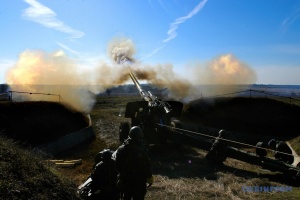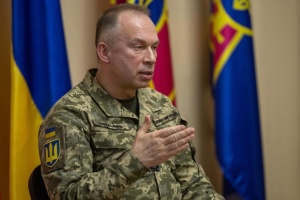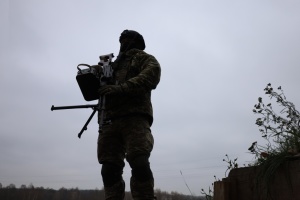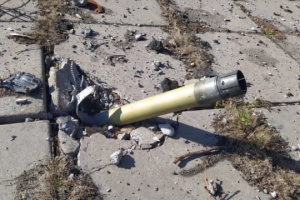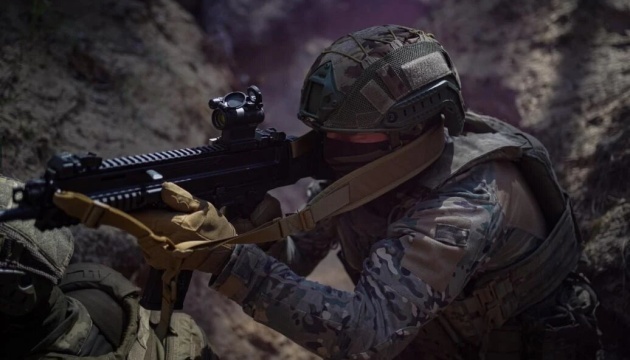
Ukraine Latest: Weekly Digest For December 2-8, 2024
MAIN EVENTS OF THE WEEK
December 8: US president-elect Donald Trump on Sunday pushed Russian leader Vladimir Putin to act to reach an immediate ceasefire with Ukraine, describing it as part of his active efforts as president-elect to end the war despite being weeks from taking office. “There should be an immediate ceasefire and negotiations should begin,” Trump wrote on on his social media platform Truth Social, adding that “they (Ukrainians – ed.) have ridiculously lost 400,000 soldiers and many more civilians”.
December 8: President Zelensky said that fatalities among Ukrainian soldiers since the outset of Russia’s full-scale invasion in 2022 have reached 43,000, an estimate much lower than a figure offered by US President-elect Donald Trump. The toll was revealed by President Volodymyr Zelensky in a statement on the social media platform X on Sunday, hours after Trump claimed that Ukraine’s had “ridiculously” lost 400,000 soldiers. Zelensky said there had been 370,000 cases of “medical assistance for the wounded” on the battlefield, including light or repeat injuries. About half of the Ukrainian soldiers wounded in action have later returned to service, he said. Also, Ukraine has been able to return 3,935 people, among them 3,767 military personnel and 168 civilians, from Russian captivity since the inception of all-out invasion of Ukraine by Russia on February 24, 2022.
December 6: Ukraine marked its national Day of the Armed Forces. President Zelensky ceremoniously handed over the initial batch of the latest Peklo (‘Hell’) hybrid drone missiles to the Ukrainian Defense Forces. The Ukrainian manufacturer created Peklo from scratch in record short time of one year.
December 7: President Volodymyr Zelensky met with US President-elect Donald J. Trump in Paris on Saturday, the first face-to-face encounter between the two since Mr. Trump won the U.S. presidential election last month after claiming that he would end the war in 24 hours. Mr. Trump and Mr. Zelensky were brought together by President Emmanuel Macron of France at the Élysée Palace on Saturday evening, ahead of the Notre-Dame Cathedral’s grand reopening. Mr. Zelensky said afterward that it had been a “productive meeting” and he thanked Mr. Trump for his determination and Mr. Macron for organizing the encounter. “We talked about our people, the situation on the battlefield and a just peace for Ukraine. We all want to end this war as quickly and fairly as possible,” the Ukrainian leader said in a statement, adding that they had “agreed to continue working together.” The meeting, which lasted about 35 minutes, appeared to be part of a broader diplomatic push by Ukraine to engage with Mr. Trump’s incoming administration and influence its plans to end to the war with Russia in a way that aligns as much as possible with Kyiv’s interests.
December 7: President Volodymyr Zelensky on Saturday said a second batch of F-16 fighter jets had arrived in Ukraine from Denmark. "The second batch of F-16s from Denmark has arrived in Ukraine. This is an example of leadership in defending lives that sets Denmark apart," Zelenskiy said in a post on X.
December 7: The US Department of Defense announced a significant new security assistance package to ensure Ukraine has the tools it needs to prevail in its fight against Russian aggression. This security assistance package commits an additional $988 million in support through the Ukraine Security Assistance Initiative (USAI) that will provide Ukraine with munitions for rocket systems and Unmanned Aerial Systems. This package also includes support for maintenance and repair programs to help Ukraine reconstitute its forces and build and sustain combat power. The capabilities in this announcement include: (1) ammunition for High Mobility Artillery Rocket Systems (HIMARS); 2) Unmanned Aerial Systems (UAS); and (3) equipment, components, and spare parts to maintain, repair, and overhaul artillery systems, tanks, and armored vehicles. This is the Biden Administration's twenty-second USAI package and part of the surge of aid for Ukraine. The United States will continue to work together with some 50 Allies and partners through the Ukraine Defense Contact Group and its associated capability coalitions to provide the support Ukraine needs to win the war.
December 3: Andrii Sybiha, Ukraine's Foreign Minister, stated that the country has learnt a painful lesson from the hopes for the Budapest Memorandum and that mistakes of this nature cannot be made again. Sybiha referred to the 30th anniversary of the signing of the Budapest Memorandum, under which Ukraine had committed to give up its nuclear weapons in exchange for security assurances. "This is a good reminder that no decisions about long-term security solutions at the expense of Ukrainian security are acceptable. This document failed to provide Ukraine with security, nor transatlantic security. We must prevent the similar mistakes to reoccur," Sybiha said. "That’s why we will discuss with partners the ‘peace through strength’ concept. We have a clear understanding of which moves we need from our friends to do our ‘homework’," he added. “Ukraine will not accept any alternatives, surrogates or substitutes for Ukraine's full membership in NATO. Inviting Ukraine to NATO now will be an effective countermeasure against Russian blackmail and will deprive the Kremlin of illusions about the possibility of hindering Ukraine on its path to Euro-Atlantic integration”, Ukraine’s top diplomat has stated.
Ukraine has restarted and sclaed up production line manufacture of its R-360 Neptune cruise missile, having put out the initial batch of 100 missiles on a new assembly line so far this year. The Neptune missile technology was upgraded to support a booster stage that increases its range beyond original specifications, according to a reported from Defense Minister Rustem Umerov. "Serial production of the R-360 Neptune cruise missiles has been successfully scaled up, with upgrades for striking targets at longer distances," the minister said. Umerov added that he held a meeting with Ukrainian missile weapon industries, addressing the industries advancement plans for 2025. The development for new missile technologies, including hybrid drone-missiles like the Palianytsia, is ongoing. Umerov said. R-360 Neptune is a subsonic cruise missile developed by the Ukrainian company Luch Design and Development Bureau. It was first showcased at the International Defense Exhibition in Kyiv in 2015 and was commissioned by the Ukrainian Navy in 2021. The 5.05 meter long missile weighs 870 kg. Initially designed as an anti-ship missile, it has since been modified to add ground target attack capability at ranges exceeding 200 kilometers.
December 5: President Volodymyr Zelensky signed a decree sanctioning the members of the Georgian government who “are surrendering Georgia to Putin”. “Ukraine has imposed sanctions on [pro-Russian billionaire former Prime Minister Bidzina] Ivanishvili and his accomplices – 19 individuals. They are the ones who are selling out the interests of Georgia and its people. And we call on Europe, America and everyone in the world to do the same – to act with principle,” the decree reads, adding, “It is crucial that our partners also voice their position now, openly declaring what is happening. And action must be taken. This is how it works in international affairs: if you do not respond in time or fail to respond with principle, then decades are lost, and countries are robbed of their freedom. We must not lose anyone in this region – neither Georgia, nor Moldova, nor Ukraine. We must stand united in defending ourselves against Moscow”. Georgian President Salome Zurabishvili welcomed the decision by Ukrainian authorities to impose sanctions on a number of Georgian government officials.
December 3-4: NATO foreign ministers, during a meeting at NATO Headquarters in Brussels, agreed on a package of measures to counter hybrid attacks and [Russia’s] hostile actions in NATO countries. At the same time, Secretary General Rutte refrained from commenting on a possible invitation for Ukraine to join the Alliance, instead emphasizing that the Allies should increase military support for Ukraine so that it could, if it decides so, negotiate with Russia from a position of strength. “Ukraine is entering another crucial winter. And Russia’s aggression shows no sign of abating. Just the opposite, Putin is ramping up his rhetoric and reckless actions. He is using Ukraine as a testing ground for experimental missiles and is deploying North Korean soldiers in this illegal war. Putin is not interested in peace. He is pressing on, trying to take more territory. Because he thinks he can break Ukraine’s resolve. And ours. But he is wrong. Ukraine has a right to defend itself. And we have a duty to help them. So we need to continue our steadfast support. In Washington, Allies agreed a financial pledge of 40 billion euros of security assistance for this year and we remain committed to this pledge. And I very much welcome recent announcements of more military aid by the US, Germany, Sweden, Estonia, Lithuania, Norway, “Mr Rutte said at a press conference ahead of the meeting. Ukraine’s Foreign Minister Andrii Sybiha, who attended the meeting, requested the North Atlantic Alliance countries to transfer at least 20 new air defense systems to Ukraine to help it sustain its air defense capability against Russian missiles and drones.
THE WAR AS IT IS
December 2/ Nesvitailov: The loss of Syria constitutes a severe blow to the Russian Federation’s reputation as a global power
December 3/ Interview: Nation of the Invincible: Andriy Lutsenko about an actor with a gun in his hands, a new life of the drama theater in Mariupol and his former traitor colleagues
December 5/ Shorts: Vasylkiv: Volunteer movement in Ukraine is one of a kind globally
December 6/ Survey: National Day of the Armed Forces: what Kyiv city residents and visitors wish Ukrainian soldiers
December 6/ Ryabtsev: cyberattacks can potentially disrupt power plant control functions
December 2: / A display of new demining equipment was unveiled in Kyiv city
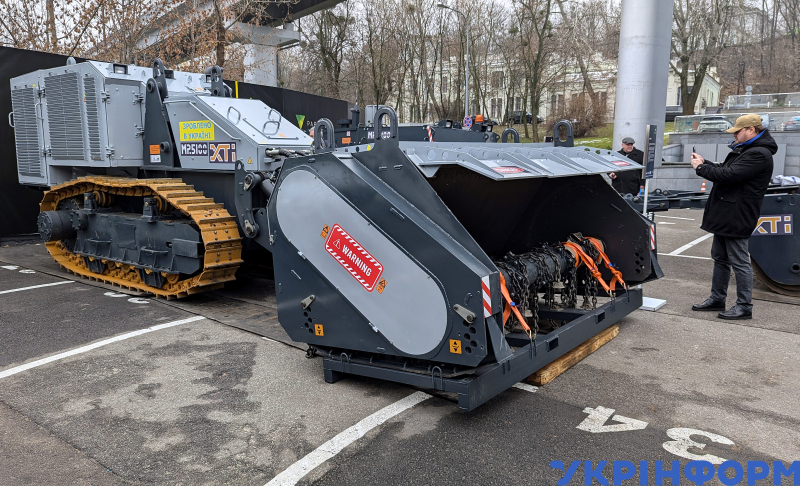
December 2: / Hutsul horses help in the rehabilitation of soldiers after treatment for wounds and injuries
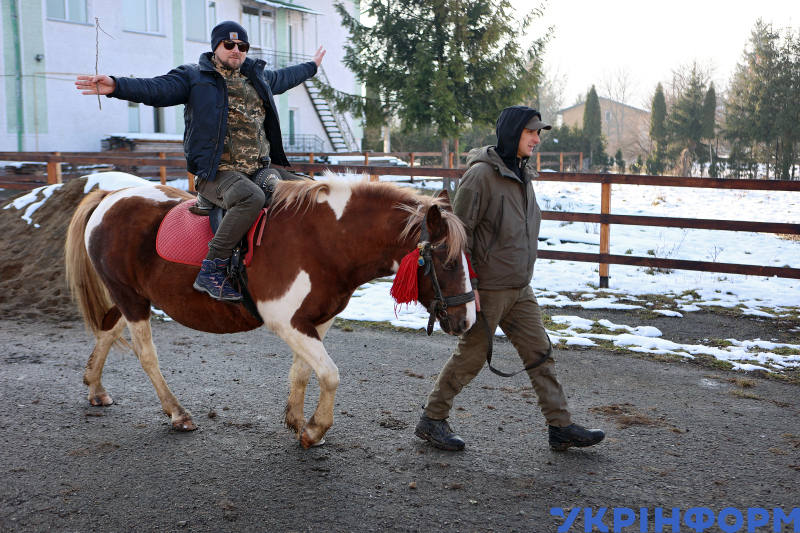
December 3: / A forward team of surgeons from the AFU Territorial Defense Force’ 110th Independent Brigade are working on the Zaporizhzhia frontline
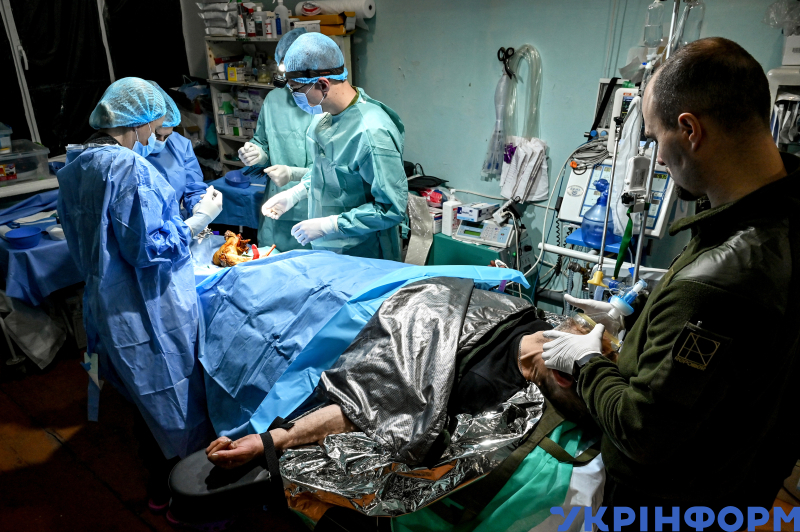
December 4/ An artillery gun crew from the AFU Territorial Defense Force’ 110th Independent Zaporizhzhia Brigade are doing their job on the Zaporizhzhia frontline
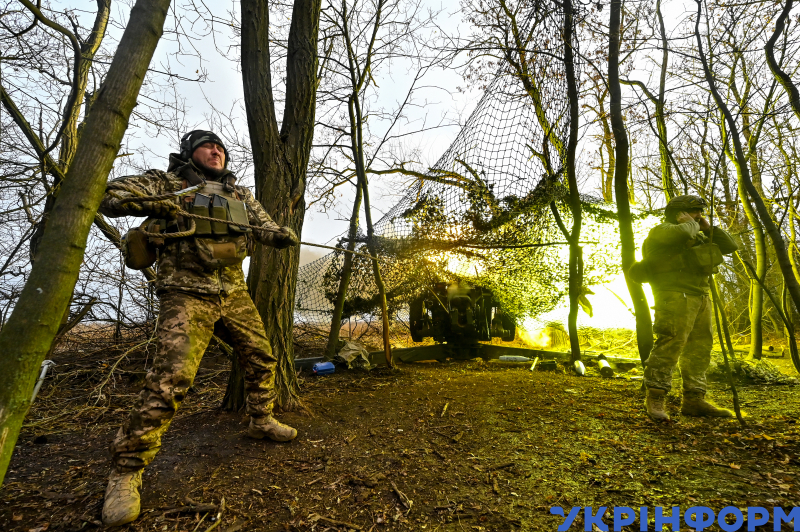
December 6/ The inaugural display of Ukraine’s indigenous hybrid drone missile Peklo (‘Hell’) took place on the national Day of the Armed Forces in the capital city of Kyiv
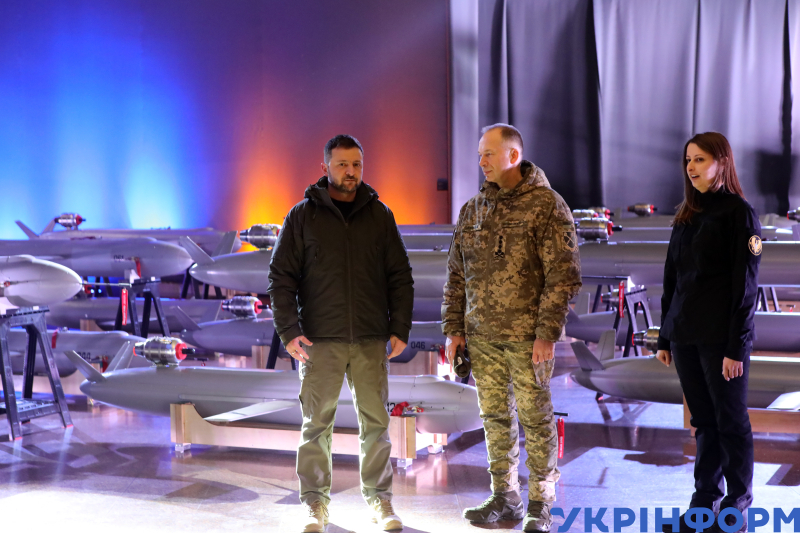
December 6/ The aftermath of Russian ballistic missile strike on downtown Zaporizhzhia city
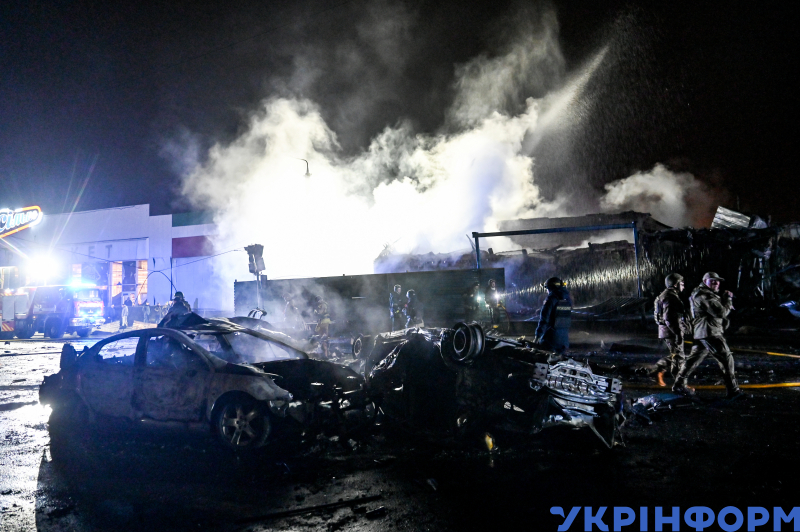
UKRAINIAN BATTLEFIELDS
Armed Forces Supreme Commander Volodymyr Zelensky:
December 3: chaired a meeting of the Supreme Commander-in-Chief's Staff addressing the progress with the domestic production of drones, missiles and artillery weaponry;
December 3: heard a report from the Armed Forces Chief Commander Oleksandr Syrsky regarding the battlefield situation in key areas of the frontline. Kurakhove and Pokrovsk remain the most challenging sections of the front. There are good news about the defense of the Zaporizhia axis of the frontline.
Ukrainian attacks on the Russian Federation and Russia occupied Ukraine
December 7: About one-third of Russia’s fuel sector facilities that supply the occupying forces have been damaged or destroyed in special operations by the Ukrainian military, Andriy Yusov, the press officer for the Defense Ministry’s HUR intelligence branch said Friday. “They are facing major problems with restoration because we’re talking about imported equipment, and they have significant problems with having this equipment supplied due to sanctions,” Andriy Yusov said in an interview with the Center for Misinformation Countermeasures. Yusov specifically highlighted that the attacks were not intended against civilian facilities but targeted the oil refineries that provide support for Russia’s military, supplying petroleum products and making cash for the war to drag on. Ukrainian forces have staged dozens of operations targeting Russian oil refineries and storage facilities that support the Russian military’s fuel supply chain. Ukraine has targeted approximately 64 oil sector facilities in Russia this year so far, significantly affecting the country’s oil refining capacity and hindering its military operations. According to Ukraine’s Foreign Intelligence Service, three Russian oil refineries have had to partially suspended operations due to incomplete repairs. Russian technicians were unable to complete repair work in October due to sanctions, reports indicate.
December 4: In the early hours of Wednesday, a series of heavy explosions were reported heard in the surrounding of Dyagilevo airbasein the Russian city of Ryazan, located 500 kilometers (approx. 310.7 miles) from the line of fighting. Dyagilevo airbase hosts the 43rd Combat Deployment and Flight Training Center with its fleet of strategic bombers, including Tu-95MS, Tu-22M3, and Tu-134UBL. It is also home to the 203rd Separate Il-78 Aerial Tanker Regiment. The aircraft repair plant No. 360 is located near the base.
Later on the same day, the Black Sea port of Novorossiysk, Krasnodar Krai, was reported to have come under attacks targeting Black Sea Fleet’s missile warships involved in attacks on Ukraine, according to Andriy Kovalenko, head of the Center for Misinformation Countermeasures under Ukraine’s National Security and Defense Council (NSDC). Novorossiysk is the second largest home base of Russia’s Black Sea Fleet and a crucial element to its military infrastructure. Following a multiplicity of strikes on BSF’s bases and facilities in Crimea, including Sevastopol where most significant losses have been reported, the Russian military command ordered a major portion of the fleet to be relocated to Novorossiysk.
December 4: A drone has struck Grozny, the capital of Russia's southern Chechnya region on Wednesday night. The drone had hit the roof of a building housing the Akhmat Kadyrov riot police regiment. Chechen leader Ramzan Kadyrov blamed the attack on Ukraine, saying it had caused civilian casualties while not providing details on the number of casualties and whether he was referring to deaths or injuries. Kadyrov has been a vocal supporter of Russia's war in Ukraine, to which he has contributed Chechen forces.
December 7: The Ukrainian Navy has released footage which it claims shows Russian-controlled gas production platforms off the coast of Crimea being targeted by unmanned surface vehicles, or sea drones. The unverified compilation, released on Saturday, showed a number of Ukrainian sea drones making their way toward natural gas drilling platforms in the Black Sea, followed by large explosions which left at least one platform on fire. The platforms, which Russia seized after it had unlawfully annexed the Crimea peninsula from Ukraine in March 2014, were used by Moscow as military installations instead of oil and gas production, mounting equipment for monitoring the airspace across the northern Black Sea, including the area that remains under Ukraine’s jurisdiction. The drones used bear a noted resemblance to Ukraine's "Sea Baby" drones, which are claimed to be able to carry nearly one ton of explosives over 1,000 kilometers (621 miles).
December 5: A hacker team affiliated with HUR, the intelligence branch of Ukraine’s Ministry of Defense, launched a wave of cyberattacks targeting Gazprombank, one of the largest banks in Russia. The cyberattack, described as a powerful distributed denial-of-service (DDOS) assault, disrupted Gazprombank's online and mobile banking services. "Hundreds of thousands of Russians will be unable to transfer money and carry out online payments due to Gapzormank applications not working," HUR said. The attack reportedly rendered Gazprombank’s website inaccessible from France and Germany, with its mobile application also experiencing outages. Gazprombank serves around 3 million individuals and 45,000 businesses and is critical for Russia’s financial system. This disruption follows sanctions imposed by the U.S. Treasury on Gazprombank on Nov. 21, further targeting the bank amid ongoing efforts to pressure Russia over its war against Ukraine.
December 6: Members of the guerilla movement Atesh sabotaged a key railway line linking Russia's Moscow and Kursk oblasts, disrupting Russian supply lines, the group claimed via Telegram on Dec. 6. The operation aimed to disrupt Russian military logistics, Atesh reported. The targeted railway connected Moscow to Kursk Oblast, which has been partially occupied by Ukrainian forces since August. "Deliveries of fuel and military equipment intended to supply Russian troops on the front line were delayed," the group said.
HOSTILITIES
December 4: AFU Chief Commander, Oleksandr Syrsky heard reports from officials in charge of specific lines of activity. The Commander-in-Chief has set them specific tasks to stabilize the situation on axes deemed most challenging and to bolster AFU’s warfighting ability, particularly by way of accumulating robust reserves.
The Russian army suffered record high losses in military equipment and personnel in November over nearly three years its war in Ukraine, Ukraine's Defense Ministry said in a press report. During November, 45,680 Russian soldiers were wounded, killed, captured or otherwise incapacitated to fight, an equivalent to more than three motorized rifle divisions of the Russian army. November 28 saw the record high daily enemy personnel loss at 2,030, the highest recorded and the first time to have surged past 2,000 since the war began on Feb. 24, 2022. In November, Ukrainian forces destroyed or disabled 307 Russian tanks, 899 armored combat vehicles, and 884 artillery guns. According to the ministry's assessment, Russia’s military lost over $3 billion worth of weapons, vehicles and equipment during November. Russia’s toll of personnel losses over the time of the all-out war in Ukraine amounted to 742,130 as of December 1, according to statistics from the General Staff.
COMMENT: Oleksandr Kovalenko, defense and policy analyst at the Information Resistance group: "The losses suffered by Russian occupiers during October and November not just surged to record high, but exceeded Russia's monthly mobilization potential, which fluctuated within the range of 35,000-40,000 men for most of 2024. If [Russia’s military personnel loss] continued at the current pace, it will soon begin to face a severe personnel gap, which will critically impact on its warfighting capability".
Ten mine action battalions have been newly organized in Ukraine in 2024 so far, while the fleet of specialized mine action vehicles has expanded to 52 vehicles from a meager two in early 2024, with 42 assigned to the Armed Forces of Ukraine and 10 to the State Special Transport Service. Further increases in the fleet of mine clearing vehicles will continue into 2025. The new battalions will be engaged in clearing liberated areas from mines, unexploded munitions and other explosive hazards.
The Russian military are losing an average five hundred soldiers per week in battles for control over Toretsk town. The invading forces are advancing, albeit too slowly, counting their progress in houses seized from Ukrainian forces. Toretsk lies some 35 kilometers (20 miles) north of Russian occupied Donetsk. The town has become one of the hottest battlefields in Donetsk Oblast in recent months as Russian troops continue advancing in Ukraine's east. There are no intact buildings or shelters left in Toretsk, allowing Russia to occupy new areas of the embattled town.
The crowdsourced monitoring website DeepState reported that Russian troops are making rapid advances toward Pokrovsk town, speeding up their offensive operations, moving particularly from the village of Zhovte toward Novotroitske and Shevchenko. It is highly likely they will be able to get the highway linking Pokrovsk to Pavlohrad in Dnipropetrovsk Oblast under fire control with an eye to disrupt Ukrainian logistics supplies.
December 2: Soldiers from the 80th Separate Airborne Assault Galician Brigade, part of the AFU’s Airborne Assault Troops fighting in the Kursk region of the Russian Federation captured 11 Russian personnel from an assault group of the 11th VDV Brigade, all of whom were recently released prisoners with only a few days of training.
AFU Naval Force units had taken out 5,610 Russian personnel, 31 armored combat vehicles and 15 tanks during November.
North Korea may deploy as many as 100,000 troops to aid Russia’s war on Ukraine if the alliance between Pyongyang and Moscow continues to deepen, according to people familiar with assessments made by some Group of 20 nations. The people, speaking on condition of anonymity, stressed that such a move wasn’t imminent and that military support at that scale — if it occurred — would likely happen in increments with troops rotating over time rather than in a single deployment. Ukraine assesses up to 15,000 North Korean troops are currently deployed to fight in Russia’s Kursk region — and possibly in occupied areas of eastern Ukraine — to rotate every few months. The North Korean deployment is being commanded by three generals, whose activities are strictly classified, and about 500 officers.
December 8: The Defense Forces cleared a part of Chasiv Yar town from a Russian infantry group who had managed to cross over the canal and fortify themselves in a ruined building. Chasiv Yar is a focal point of Russia’s offensive operations in Ukraine’s eastern region of Donetsk. The capture of the town would open Russian forces a gateway to offensive on other key cities in the region—Kostiantynivka, Druzhkivka, Kramatorsk, and Sloviansk.
December 3: AFU’s Special Operations Forces wiped out 17 Russian invaders and forced eight others into captivity during two raids on the Kursk region of the Russian Federation.
December 3: Adversary forces are pulling up reserves to sustain ongoing offensive operations on the Kurakhove, Vremivka, and Pokrovsk axes. Russian females with a criminal record are being involved.
December 3: The adversary forces attempted to set up and hold a bridgehead on the eastern bank of the Oskil River in the vicinity of Novomlynsk settlement outside Kupyansk town, Kharkiv Oblast. The adversary, leveraging their superiority in personnel and equipment, were able to crossed over the river. Ukrainian defenders, assisted by artillery and UAV support, knocked out enemy soldiers and cleared the bridgehead.
Attempts to level the front line along the Kurakhove and Pokrovsk axes are costing the enemy heavy losses in manpower and equipment; the invaders have to bring in strategic reserves to sustain their assaults.
December 4:Enemy forces are mounting massive assaults that enable rapid advances along the Kurakhove axis. AFU forces hold active defense, going on to the offensive seeking to win back their lost positions on the line of battle.
The Russian invaders are planning for an offensive on Kherson city, having assembled 300 boats amid preparations to cross over the Dnieper River.
December 5: The settlement of Novy Komar, located outside of Volnovakha in Ukraine’s eastern Donetsk region, remains under Ukrainian military control. The enemy has been ousted away from the location.
December 5: Soldiers from AFU’s Special Operations Force fighting in the Kursk region seized Russian fortifications, having taken out 17 personnel and captured 12 others into captivity.
The adversary are continuously assaulting with infantry the Ukrainian defenses near Toretsk town, sparing no soldier lives, endeavoring to deplete the Defense Forces’ momentum.
December 5: On the Toretsk axis, the Defense Forces deployed a successful counterattack to break down their foes located in the Donetsk region’s Nelypivka village.
WEEK IN NUMBERS AND PICTURES
Russian drone and missile attacks on the Ukrainian regions of Donetsk, Kherson, Zaporizhia and Kharkiv killed 19 civilians and left 78 others injured over the week under review.
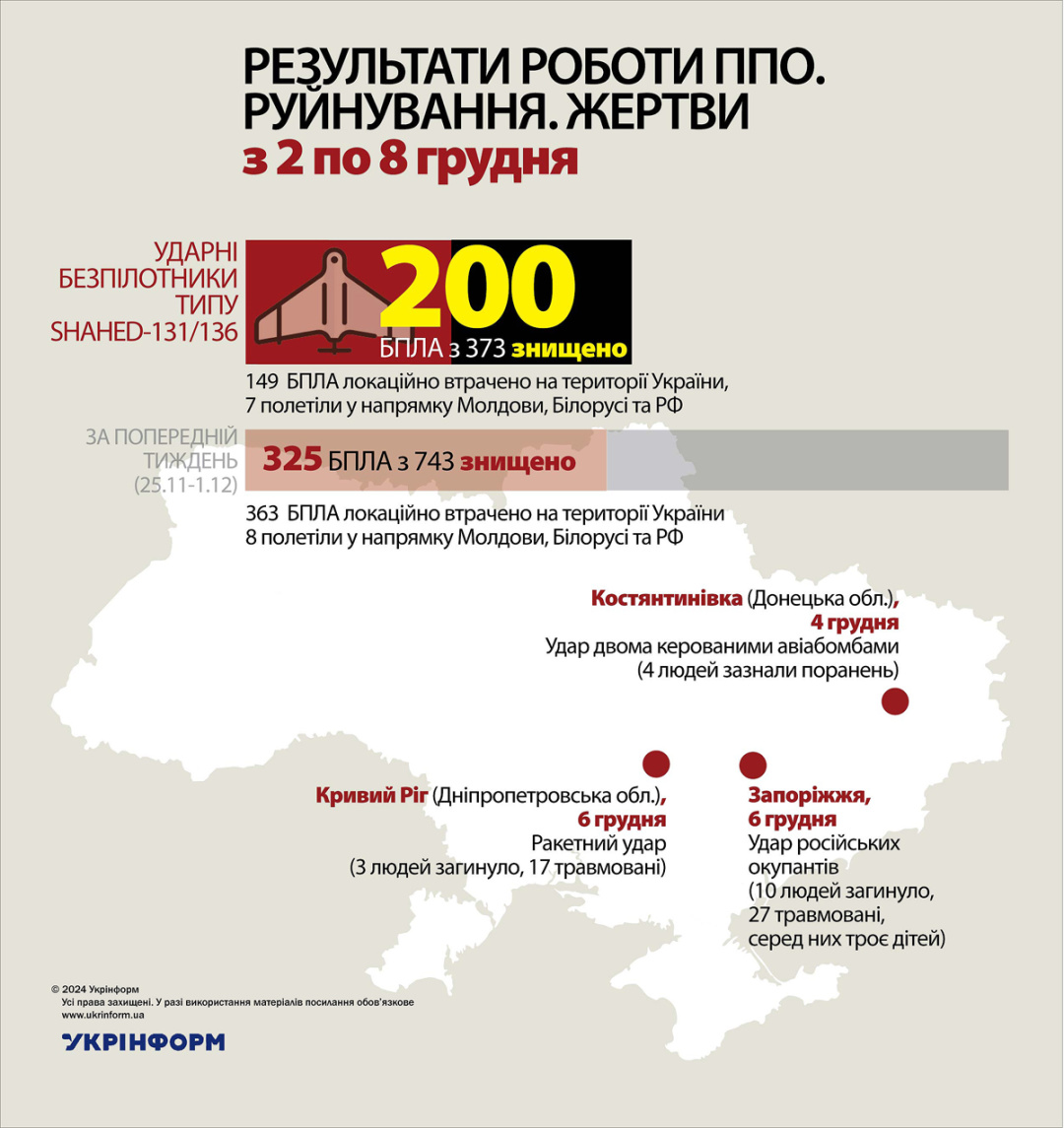
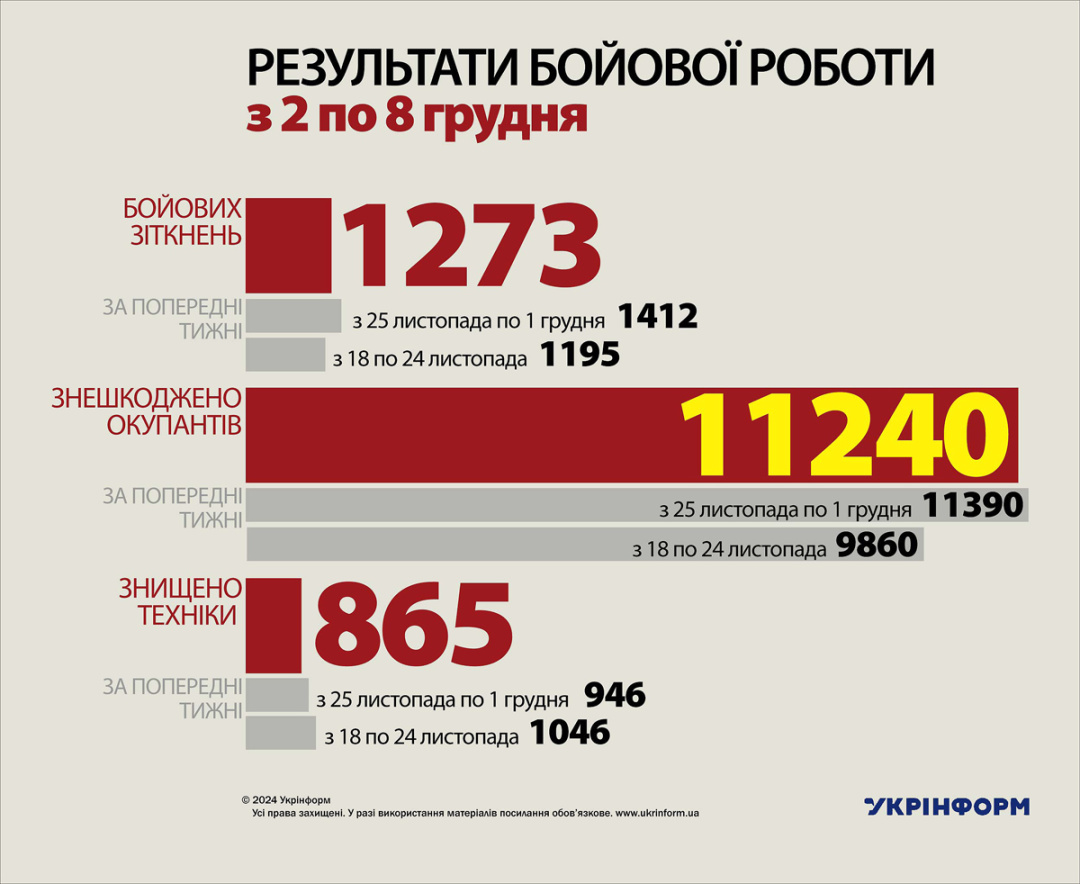
WAR AFTERMATH
Human losses & war crimes
The Yale Humanitarian Research Lab released a new report on Russia's coerced adoption of Ukrainian children. According to Ukrainian authorities, Russia has forcefully deported over 19,500 Ukrainian children. Yale HRL identified 314 Ukrainian children who have been adopted by Russian families and placed into institutions across 21 regions in Russia. Most critically, children taken from Ukraine are fundamentally presented in Russia’s databases as if they were from Russia. For this, Russia’s officials amended the federal law to simplify the process of conferring Russian citizenship to children from Ukraine who were allegedly orphaned or left without parental care. This fast-tracked the issuing of Russian citizenship to children from Ukraine, which, according to law, is required for children to be placed under the guardianship of — or adopted by — families in Russia. None of the databases analysed by Yale HRL include information suggesting that the child is from Ukraine and or acknowledging their Ukrainian nationality or place of origin. Approximately half (46.6%) of the children identified have siblings also listed in the databases. In at least one case, three children from a family of four were placed with a citizen of Russia without their fourth, eldest sibling who remained listed for adoption on Russia’s databases.
December 4: The head of the Zaporizhzhya region's military administration, Ivan Fedorov, has said that the mayor of the Ukrainian town of Dniproprudne died after being tortured while in Russian custody. The body of Yevhen Matveyev was recently returned to Ukraine during the most recent prisoner swap with Russia, which has occupied Dniproprudne since the early days of the February 2022 full-scale invasion, Fedorov reported via Telegram mess. app. Wednesday. Matveyev was captured by Russian forces on March 13, 2022. Last month, Ukraine recovered the bodies of 502 fallen soldiers and civilians, including 17 from morgues in Russia, as part of an exchange of prisoners of war between the two countries. "He was held captive by the occupiers for two years and eight months and tortured to death. During the last exchange, his body was returned to Ukraine," Fedorov said. Matveyev refused to abandon his town after occupation, and continued working to ensure the functioning of essential services and keep the population informed about ongoing events. Matveyev's death underscores the brutal conditions under which Ukrainian soldiers and civilians have been held while in Russian captivity. A UN Commission of Inquiry on Ukraine found "continued war crimes and human rights violations gravely impacting civilians," including confirmation that "Russian authorities have used torture in a widespread and systematic way in various types of detention facilities."
Society
The Verkhovna Rada Commissioner for Human Rights Dmytro Lubinets refuted claims by the Russian Ombudsman Tatyana Moskalkova about the Ukrainian prisoners of war who allegedly are refusing to be taken home. According to media reports, Moskalkova published a list of 630 Ukrainian POWs Kyiv is reluctant to exchange. Ukraine’s defense intelligence service, the HUR, discovered multiple errors in the names and birthdates specified in the lists circulated by Russia, and seven prisoners have already been exchanged. Moreover, the published lists do not include the seriously wounded and females, who, under international humanitarian law, should be returned first. Lubinets, responding to the claims made by his Russian counterpart, said, ““Once again, I learn about the lists of Ukrainian prisoners of war, allegedly not willing to be repatriated, published by the Russian human rights commissioner. Once again, I refute this information and confirm Ukraine’s readiness to bring all of its citizens home from captivity and illegal detention!”
Since the outset of the full-scale war in Ukraine, 2,167 healthcare facilities have been reduced to ruins or severely damaged in Russian attacks.
Culture
A total of 1,222 objects of cultural heritage in Ukraine have sustained damage due to the Russian invasion beginning in February 2022, among them 43 objects damaged during November. Russia’s war in Ukraine has claimed the lives of 132 workers of art and 93 media professionals.
UKRAINIAN HOME FRONT
President Volodymyr Zelensky:
December 4: Dismissed Tamila Tasheva as presidential envoy to the Republic of Crimea;
December 5: in a speech addressed to International human rights conference “Decade 2014-2024: Reclaiming human rights” in Kyiv Thursday, said that at least six Ukrainian city mayors and community heads are currently being held captive by Russia, and the world is too weak in responding to Russia’s brutal treatment of Ukrainian war prisoners.
December 5: had a phone call with NATO Secretary General Mark Rutte to brief him on the situation on Ukrainian battlefields overall and in specific areas of the Donetsk region, the progress of the Kursk offensive and the results of Ukraine's use of long-range capabilities provided by the allies. He furthermore highlighted the importance of uninterrupted supplies of 155 mm caliber shells, weapons, and military equipment included in announced support packages to ensure timely equipping of combat brigades. Volodymyr Zelensky and Mark Rutte agreed to intensify cooperation with partners to implement the decisions of the NATO Washington Summit concerning futher bolstering of Ukraine's defenses against Russia’s air terror in winter. The President also stressed the importance of inviting Ukraine to NATO.
December 5: enacted a National Security and Defense Council (NSDC) resolution regarding national security threats to Ukraine’s health care system amid contingency period.
December 5: enacted a legislation on “Affordable Housing for Internally Displaced Persons”, with provisions for a comprehensive inventory of available real estate.
Following are key takeaways from President Zelensky’s interview with the Japanese news agency Kyodo News Sunday:
- more communication is needed between Ukrainian officials and US president-elect Donald Trump’s team;
A US-Europe alliance is critical for Ukraine, it is scary to be lost and hopefully will not be lost;
- Ukraine is seeking an early end to the war with Russia and the return of part of its territory by Moscow through diplomacy after Kyiv's NATO membership becomes certain;
- North Korean soldiers deployed in western Russia to fight on Moscow's side in the war have been killed, and it is almost certain they will ultimately be used as "cannon fodder" on the front lines of the conflict;
- support for Ukraine from its partners is "insufficient"; NATO should invite Kyiv for membership talks with the transatlantic military alliance as soon as possible;
- it is difficult to retake by force some of the Russian-occupied parts of the country, including Crimea that Russia annexed in 2014: “Our army lacks the strength to do that. That is true, we do have to find diplomatic solutions";
- but such steps could be considered "only when we know that we are strong enough", that Russia cannot launch a new aggression against Ukraine;
- the war has entered a "complicated period";
- expressed appreciation for Japan, the United States, South Korea and numerous European and other countries that have provided assistance to Ukraine and imposed sanctions on Russia, but more help is needed to strengthen Ukraine;
- Crimea is of "strategic" significance not just for Ukraine, but is strategic in principle for the world, because he who controls Crimea controls the Black Sea security.
December 2: German Chancellor Olaf Scholz made his first visit to Kyiv since the summer of 2022, signaling continued support for Ukraine amid ongoing challenges at home and abroad. The visit, seen by many as politically motivated ahead of Germany’s elections, included a meeting with Ukrainian President Volodymyr Zelensky. Scholz announced a significant military aid package worth €650 million, set to be delivered in December, underlining Germany’s position as “Ukraine’s strongest supporter in Europe.” Scholz emphasized Germany’s commitment, stating, “We say what we do, and we do what we say,” aiming to assure Kyiv of unwavering support. However, he stood firm on his decision not to supply Taurus long-range missiles. Scholz has been cautious about talk of fast-tracking NATO membership for Ukraine. He has emphasised the importance of finding a path to peace, which he insists "must not be chosen over Ukraine's head". Observers note that the rush to provide arms and funding for Ukraine is partly driven by fears that Trump, if reelected, may prioritize peace negotiations with Russia over prolonged conflict. Scholz’s visit, therefore, is not only a gesture of solidarity but also part of a broader strategy by globalist factions to fortify Ukraine before the geopolitical landscape potentially shifts again.
December 2: During the “Demine Ukraine Forum 2024”, Prime Minister Denys Shmyhal said that approximately 139,000 square kilometers of Ukrainian land are potentially contaminated with explosive remnants of war, which is larger than the area of Greece, Bulgaria or Austria. Of these, almost 35.500 square kilometers have been reclaimed back to use for farming. More than 760 civilians, including 86 minors have suffered from Russian mines.
December 5: The Verkhovna Rada issued an appeal to parliaments and governments of foreign states, the UN, the European Union, the North Atlantic Treaty Organization and its parliamentary assembly on the occasion of the 30th anniversary of the signing of the Memorandum on Security Assurances in Connection with Ukraine's Accession to the Treaty on the Non-Proliferation of Nuclear Weapons (Budapest Memorandum) at a plenary session of parliament on Thursday. In the appeal, the MPs raised the issue of the lack of legal grounds for Russia’s membership in the UN. The Verkhovna Rada additionally suggested "initiating a global dialogue aimed at developing a new system of universal, unconditional security guarantees based on existing mechanisms and at the same time increasing the responsibility of states possessing nuclear weapons, which would reduce the likelihood of states seeking to obtain nuclear weapons and would contribute to strengthening trust and strengthening the global regime of non-proliferation of nuclear weapons."
December 5: The inaugural meeting of the Coordination Headquarters for the Treatment of Prisoners of War took place in Kyiv under the chairmanship of Ukrainian defense intelligence chief Kyrylo Budanov.
December 5: The Ukrainian military will get over 30,000 DeepStrike attack drones in 2025 as part of President Volodymyr Zelensky's resilience plan, Defense Minister Rustem Umerov announced Thursday. DeepStrike drones are of the new generation, capable of "operating autonomously over long distances and hitting targets with high accuracy,” Umerov said, adding, "We are demonstrating to the world that Ukraine can be innovative and independent technologically. Even amid war we are developing cutting-edge technologies and strengthening our defense capabilities.”
December 5: Prime Minister Denys Shmyhal made a tour of the Kharkiv region, where he particularly visited construction sites of bomb shelters at a lyceum and a preschool daycare center. Construction of fortifications in the Kharkiv region has been 99.99 percent completed, 800 strongholds have been built and outfitted with equipment and the bare essentials. The government has earmarked over UAH 200 million in funding for construction of bomb shelters and measures to safeguard hospitals in the Kharkiv region from potential air attacks.
December 5: Ukraine marked the 30th anniversary of the signing of the Memorandum on Security Assurances in Connection with Ukraine's Accession to the Treaty on the Non-Proliferation of Nuclear Weapons (known a Budapest Memorandum).
COMMENT: Roman Bezsmertny, diplomat: “The Budapest Memorandum has become a conspicuous example of how declarations remain just words if they are not backed by effective implementation tools… The document is not a guarantee in itself. Guarantees are implemented through specific measures: the building of missile and air defenses, and military bases, and the creation of mechanisms for collaborative monitoring and control. Instead, Ukraine was expecting that the memorandum as part of international law would work “automatically”. In practice this turned out to be a false expectation. This is our mistake and experience both at the same time.”
In November, the Ministry of Defense gave approval to deployment of more than 120 weapons and military equipment products to the Defense Forces’ units. Of these, approximately 90 percent are new products developed and manufactured domestically in Ukraine, according to the press center at the Ministry of Defense.
Military unit commanders can now recruit personnel by themselves without the involvement of military enlistment and recruitment authorities, under a new procedure effective as of October 1. More than 2,000 conscripts and reservists have already availed of this procedure.
Military personnel who for the first time went AWOL (absent without official leave) without intent to desert of committed desertion, and who voluntarily return to service no later than January 1, 2025 will continue their military service without remorse and conflicts with the legislation of Ukraine. Such persons will remain eligible for monetary allowance, food allowance and allowances of other categories as well as the benefits and social security guarantees established by law.
The Cabinet of Ministers:
decided to reorganize the Ministry for the Reintegration of Temporarily Occupied Territories into the Ministry of National Unity of Ukraine;
endorsed Rules of Procedure on the Government Commissioner for Customs Reform and appointed Ihor Smilyansky, CEO at JSC Ukrposhta, to this role;
endorsed a decision to kick off eQueue, a pilot project for booking the time of border crossing.
Verkhovna Rada of Ukraine:
appointed Oleksiy Chernyshov, Naftogaz Group CEO, as Deputy Prime Minister of Ukraine - Minister of National Unity of Ukraine;
gave overall approval to a bill amending the Budget Code of Ukraine;
postponed for eight months the entry date of the Law of Ukraine "On Lobbying";
adopted legislation on the prevention of bribery of foreign public officials;
adopted legislation to dismiss the Commission for Gambling and Lotteries Regulation (KRAL); introduced enhanced control over the activities of gambling and lotteries organizers.
Over the time from January through September, 2024, Ukraine fulfilled 199 out of 531 commitments under cooperation programs with international partners. The Ministry of Finance has updated the Reforms Matrix, an analytical tool with conditionalities and recommendations of Ukraine's international partners. The updated Reforms Matrix includes 325 conditionalities and recommendations, which correspond to 531 indicators to be accomplished over the next 10 years. Despite the war challenges, Ukraine, with the support of its partners, continues on the path of structural reforms that lay the foundation for and promote Ukraine's long-term growth on the path to EU integration. Priority areas include justice, fundamental rights and security, energy, financial services, and financial and budgetary provisions.
The government renewed procedure for conscripts’ reservation through "Diia" portal starting December 1, 2024. The procedure provides deferrals from mandatory conscription into military service for employees of critical enterprises. After an audit of decisions on determining enterprises, institutions and organizations as critical, 5% of enterprises lost their status while the other 95% retained their status.
The Supervisory Board of Naftogaz Group elected Roman Chumak, who previously served as the Company’s Finance Manager, as interim chairman of the board and voted to start candidate selection process for this position.
December 4: A new public award - the Invincible Heroes of Media medal -- was unveiled at a ceremony in Kyiv. The award will honor journalists amid war.
Deputy Presidential Envoy to the Autonomous Republic of Crimea Olha Kuryshko was appointed to serve as Interim Envoy.
The Institute of Mass Information experts recorded 27 freedom of speech violations in Ukraine in October, according to the monthly IMI monitoring “Freedom of Speech Barometer”. Russia's crimes (19 cases) inlcuded opening fire on journalists, damaging media offices, death threats, cyber attacks, and legal pressure. The death of two media professionals were reported in November: (1) Oleksiy Andreyev, an army serviceman and TV cameraman from Mariupol. He was buried in Chernivtsi on November 2, 2024, having been previously assigned missing in Bohdanivka (Donetsk oblast, Bakhmut district) on November 29, 2023. His body was retrieved in the most recent swap. A DNA analysis confirmed his identity. Oleksiy Andreyev worked as a cameraman at the Mariupol TV channels "TB7" and "Sigma" and the Azovstal plant press officer since the 2000s; (2) Andriy Buchak, Luhansk-based journalist who had been fighting on the front line since 2014. Andriy Buchak went missing in action on August 13, 2024 near Vodyane village (Donetsk oblast). His death was reported by his wife Olena on November 24, 2024. In the 2000s, Andriy Buchak worked in the Luhansk newspaper Kuryer.
WAR ECONOMY
Prime Minister Denys Shmyhal announced that natural gas, heat and electricity prices will remain as they are until the end of the heating season.
Minister of Finance of Ukraine Serhiy Marchenko, Governor of the National Bank of Ukraine Andriy Pyshny and Vice President of the European Commission Valdis Dombrovskis signed a memorandum of understanding and a loan agreement between Ukraine and the EU to solicit up to 35 billion euros worth of macro-financial assistance (MFA) for Ukraine.
Minister of Finance Serhiy Marchenko signed an agreement on the launch of the Ukraine Loan Cooperation Mechanism (ULCM), which will create a legal framework for servicing and repayment of up to EUR 45 billion in funds received by Ukraine. The mechanism will allow the use of windfall proceeds from immobilized Russian sovereign assets to cover the principal amount of the loan raised from partners under the G7 ERA initiative, as well as interest and other costs incurred by Ukraine in connection with the borrowing of the funds. Funds available through the ULCM cannot be used for purposes other than repayment of eligible loans provided to Ukraine by creditors under the G7 Extraordinary Revenue Acceleration Loans for Ukraine (ERA) initiative.
Ukraine's international reserves grew by 9.1% in November to reach USD 39.9 billion as of December 1, 2024.
International Atomic Energy Agency (IAEA) Director General Rafael Grossi said that Ukraine’s three operating nuclear power plants have “largely restored” electricity production following reduced outputs last month over Russian airstrikes. A statement by the IAEA chief on Thursday said that eight of the nine reactors in the country’s Khmelnytskyi, Rivne, and South Ukraine nuclear power plants are currently operational, with the remaining reactor currently being in shutdown. “Over the past week, most of them have gradually increased output again, even though some units operated below full capacity for several days after the military strikes on 28 November, which affected electrical infrastructure that is essential for nuclear safety,” the statement said, indicating that some off-site power lines still remain disconnected. Grossi was quoted as saying that a stable electricity grid providing secure off-site power is essential to ensure nuclear safety at these nuclear power plants, which he said are vital for the country’s electricity needs, especially amid the winter months. On the Zaporizhzhia Nuclear Power Plant, Europe’s largest and one of the world’s 10 biggest, which has been under Russian control since March 2022, Grossi said the situation at the site remained "precarious," with both remaining power lines connecting to the site being prone to frequent outages.
December 1: the updated electronic payment system (EPS) of the National Bank – EPS-4.1 – began operating in Ukraine.
Ukraine has exported 18.380 million tons of grain and leguminous crops since the beginning of the 2024/2025 marketing year (MY).
In November 2024, Ukraine exported 6.2 million tons of agricultural produce, 6.5% down month-on-month from October.
In November, the Customs transferred UAH 51.3 billion in payments to the national budget, having met 78.7 percent of the target.
The hryvnia corporate loan portfolio of banks has expanded at the rate of almost 22% over the past 12 months, surpassing the economy’s growth rate.
ALLIED AND PARTNERS’ AID
The leaders of EU member states will gather on December 19 for the first summit since the new leadership of European institutions took office. Ukrainian President Volodymyr Zelensky has been invited to attend, European Council President António Costa pointed out in an invitation letter to EU leaders. Costa convened this summit, his first since taking office as President of the European Council at the beginning of December. According to Costa, the situation in Ukraine will be the main focus of discussions.
SpaceX received a Pentagon contract to expand Ukraine's access to a more secure, militarized version of its Starlink satellite network, deepening the company's involvement in the conflict despite founder Elon Musk's ambivalence over the war.
December 4: A Ukrainian delegation met on Wednesday with senior representatives of President-elect Donald Trump, a source familiar with the meeting said, as Ukraine seeks support from the incoming team in its war to repel Russian invaders. The Ukrainian delegation was led by Andriy Yermak, a top aide to President Volodymyr Zelensky. The group met in Washington with Trump's choice for White House national security adviser, Mike Waltz, and his Ukraine/Russia envoy, Keith Kellogg.
US President-elect Donald Trump has said that US aid to Kyiv will probably be reduced after his return to the White House on 20 January. Prior to the November election, Trump had chastised Joe Biden's administration for overspending on Ukraine aid and for being unable to end the Russo-Ukrainian war. Since his election victory, Trump has largely avoided discussing his administration's approach to the war, but has repeatedly emphasised the need for it to stop.
Finland has approved a new package of security assistance to Ukraine worth EUR 25 million, containing winter equipment for Ukrainian troops among other supplies. Other details are not disclosed for security reasons, however, the country’s ministry of defense noted that they took into account both the needs of Ukraine and the resource situation of the Defense Forces.
The Netherlands is allocating EUR 22 million in aid to Ukraine. The funds will be spent on reinforcing Ukraine’s air defenses, among other things, Dutch Foreign Minister Caspar Veldkamp has announced. "At yesterday's NATO-Ukraine Council, I also stressed the importance of bolstering Ukraine's military capacities. The Netherlands is allocating an additional €22 million to projects aimed at Ukraine's air defense and cyber resilience via NATO,” he said.
December 6: The U.S. announced Friday it is sanctioning North Korean digital currency mixing firm Blender.io, which the country allegedly uses to launder stolen virtual currency and support cyber crimes. The sanctions, imposed by the Treasury Department’s Office of Foreign Assets Control, are the first ever on a digital asset mixing service. The new sanctions also point to the growing use of digital assets to perpetuate illegal acts by state actors and individuals. Blender is accused of helping Lazarus Group, a sanctioned North Korean cyber hacking group, to carry out a $620 million digital currency heist in March, the biggest of its kind to date.
December 4: Exploring different options for deploying Western troops to Ukraine is “gaining momentum” in European capitals, Dutch Defense Minister Ruben Brekelmans said Wednesday. “We are compelled to think about this now; but it is still in its early stages,” Dutch newspaper De Volkskrant quoted Brekelmans as saying. “Everything I say about it is premature. However, this discussion has started in several capitals and may be gaining momentum.” He noted that it will take some time before any position on this matter becomes more concrete, as no clear proposals exist yet. “The risk in [peace] negotiations now is that Russia holds the upper hand,” Brekelmans added.
COMMENT: Volodymyr Ohryzko, former Foreign Minister of Ukraine, head of the Center for Russian Studies: “Can a NATO member states take any action individually? Of course, they can, acting not as NATO members, but as members of the UN, which, in accordance with Article 51 of the UN Charter, provides assistance to a country that has become a victim to armed aggression… Each sovereign state can make an appropriate decision at the national level that it wants to help the victim of aggression to counteract that aggression.”
December 4: U.S. House Speaker Mike Johnson said on Dec. 4 that he will not put to a vote a request for an additional $24 billion in aid to Ukraine following reports that President Joe Biden was quietly asking Congress to green light further assistance to Kyiv before he leaves office. Roughly $16 billion of the sum could be used to restock U.S. arsenals, while the remaining $8 billion would go to the Ukraine Security Assistance Initiative (USAI. When asked if he would add aid for Ukraine to a continuing resolution to fund the government, Johnson rejected such a move. "I’m not planning to do that," he said during a press briefing. "It is not the place of Joe Biden to make that decision now, we have a newly elected president, and we are going to wait and take the new commander in chief’s direction on all that, so I don’t expect any Ukraine funding to come up now," he added.
December 6: Representatives of European Union countries failed on Friday to approve a 15th package of sanctions on Russia, targeting its “shadow fleet “of oil tankers, which included an extension for the Czech Republic to import Russian oil-based products coming mainly through Slovakia, Reuters has reported. Two member states blocked the passage over a disagreement about extending the time given to European companies disinvesting from Russia. EU members will come back to the package later.
Czech volunteers from the Skupina D group have raised more than 203.7 million kroner (more than 8 million euros) for drones for Ukraine as part of the Drony Nemesis initiative. It is noted that this amount is enough to buy 20,000 FPV drones. 15,000 have already been purchased, of which 12,000 have already been delivered to the Ukrainian military, and another 3,000 will be delivered by Christmas.
BAE Systems has signed individual contracts worth a total of approximately $2.5 billion with both Sweden and Denmark for new CV90 combat vehicles. Under these contracts, Denmark is procuring 115 new CV9035MkIIICs, while Sweden has agreed to acquire a total of 50 new vehicles. The agreement also includes further 40 vehicles for Ukraine financed by the two governments. Together, this takes the total value of CV9035MkIIICs contracted under the framework agreement to approximately $2.5 billion, including spares, support, logistics, and training.
L.T. General Keith Kellogg, President-elect Trump’s choice for special envoy to the Russia-Ukraine war, when asked to share his thoughts about the idea of ending the war by accepting Ukraine into NATO (referring to President Zelensky's suggestion on a partial membership for Ukraine) said that he would not comment on this, since it depends on the decisions to be made by Donald Trump when he takes presidential office - FoxNews. At the same time, Kellogg added that while Trump has never put his proposals on the table yet, he is very serious about his pledge to bring the war to a close.
December 4: German Chancellor Olaf Scholz sees no need to train Ukrainian soldiers to use Taurus missiles, as he has no intention to transfer them to Kyiv, nor is he considering sending Bundeswehr soldiers to Ukraine after the war is over. The German foreign minister Annalena Baerbock, for her part, said Germany was committed to supporting any initiative promoting lasting peace in Ukraine. She said her government is open to the possibility of sending soldiers to Ukraine in the event of a peace deal. “The German side will support everything that serves peace in the future,” Annalena Baerbock said on the sidelines of a NATO meeting in Brussels on Wednesday.
The Chinese government, in response to the United States' restrictions on supplies of advanced chips to China, has banned the export to the United States of gallium, germanium, and antimony, the minerals that are indispensable in the production of microcircuits and military products.
WAR&LIFE
December 2/ Russo-Ukrainian war: not regional, but is it World War III?
QUOTE: “…If we talk about today's World War III as a hot one, then we are somewhat ahead of events. But if we talk about today's Third World War as a political, economic, ideological, cyber warfare, then yes - it really is the Third World War.
December 4/ "The main mission is to evacuate people": A story of a volunteer who came under Russian drone attack while working in the Donetsk region.
QUOTE: "A drone hit the front wheel. When I came to my senses a little bit, I saw that fuel was dripping from my bus and another drone was approaching. At that moment I thought that was it... I tried to crawl, but I couldn't. I looked at my leg, it was hanging, almost torn off, the bone crushed. My first thoughts at that moment... "this is a f@ck." But I had a wild desire to live. I definitely understood that I wanted to live…”
December 4/ “I got up and walked until I eventually reached the summit : How veterans on prostheses conquered the snowy Hoverla
QUOTE: “I am overwhelmed with emotions right now. I feel tired and happy at the same time. It was hard to climb, my prosthetic leg was hurting. I sat down four or five times along the route and thought about stopping. But I saw my comrades continuing to climb. So they can, why can’t I? I got up and walked, until I eventually reached the summit.”
December 5: 30 years from the signing of the Budapest Memorandum: Betrayal? Priceless experience? A second wind?
QUOTE: “This document is just a piece of paper that brought Ukraine bitter experience. The building of a highly capable army and Ukraine’s membership in NATO (and the EU) is the only recipe that can secure our country in the modern world.”
December 6: / AFU turns 33: A path from a million-strong army back to a million-strong army
QUOTE: “The 33-year history of Ukraine’s Armed Forces records an amazing path from being known to nobody and trusted by anybody (except Ukrainians themselves) just three years ago to achieving global renown for their resilience, bravery and determination to win. Today, each and every Ukrainian are proud to say that they trust the Armed Forces of Ukraine.
Compiled by Maryna Dmytriv, Kyiv

